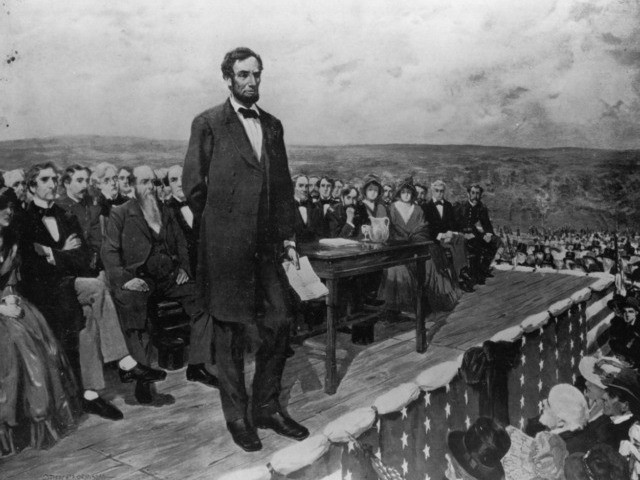Abraham Lincoln was born on February 12th two hundred and eleven years ago.
No national holiday commemorates the birthday of America’s first Republican president. It is a holiday for government employees in a handful of states including New York, Connecticut, and Illinois. While some may lament this, it is perhaps fitting that Americans honor Lincoln while laboring and that ensuring that the legacy of Lincoln does not perish from this earth is a task not of the federal government but of the people, by the people, for the people.
Lincoln is best known for his two most lasting legacies, the establishment of our union of states as indivisible and emancipation. He was a nationalist who never doubted that the United States government should put the American people first. Our boundaries mark out the United States as “the home of one national family,” Lincoln wrote.
He was a product of that vast continental home in a way that no previous president had been. His father came from Virginia. His grandfather from Pennsylvania. Prior to that, the mists of history descend but it is thought his people came out of New England. He was born in Kentucky. As a boy he lived in Indiana and as a young man he lived in Illinois.
Lincoln delivered his first political speech in 1832 at the start of his campaign for a seat in the Illinois state legislature.
Gentlemen, Fellow-Citizens: I presume you know who I am. I am humble Abraham Lincoln. I have been solicited by many friends to become a candidate for the Legislature. My politics are short and sweet, like the old woman’s dance. I am in favor of a national bank. I am in favor of the internal improvement system and a high protective tariff. These are my sentiments and political principles. If elected, I shall be thankful. If not, all will be the same.
Lincoln’s support of tariffs did not diminish with political experience. In his first campaign for a seat in the U.S. Congress, Lincoln declared, “Give us a protective tariff and we will have the greatest nation on earth.”
Lincoln did not share the groundless belief of so many opponents of the tariffs then and now that consumers ultimately bore the full cost of tariffs. In notes he wrote after his election to Congress in 1846, he explained that the costs of tariffs were not simply passed-through by consumer prices.
I suppose the true effect of duties upon prices to be as follows: If a certain duty be levied upon an article which by nature cannot be produced in this country, as three cents a pound upon coffee, the effect will be that the consumer will pay one cent more per pound than before, the producer will take one cent less in profits; in other words, the burden of the duty will (be) distributed over consumption, production and commerce, and not confined to either.
But if a duty amounting to full protection be levied upon an article which can be produced here with as little labor as elsewhere, as iron, that article will ultimately and at no distant day, in consequence of such a duty, be sold to our people cheaper than before, at least, by the amount of the cost of carrying it from abroad.
It has been reported that Lincoln once summed up his thoughts on trade by declaring, “I don’t know much about the tariff but I do know that if my wife buys her cloak in America, we get the money and the cloak, and that American labor is paid for producing it; if she buys her cloak abroad, we get only the cloak, the other country gets the money, and foreign labor receives the benefit.” While some historians have challenged the authenticity of this line, there is little doubt that it accurately reflects Lincoln’s thoughts.
As Pat Buchanan wrote in The Great Betrayal: How American Sovereignty and Social Justice Are Being Sacrificed to the Gods of the Global Economy, “The Great Emancipator was the Great Protectionist.”
During his presidency, Abraham Lincoln presided over the resurgence of protective tariffs, signing at least ten tariff bills. One of the president’s allies in raising tariffs was Rep. Justin Morrill of Vermont, who said, “I am for ruling America, for the benefit, first, of Americans, and for the ‘rest of mankind’ afterwards.”
Lincoln lived to see the Union triumphant in the Civil War and signed the constitutional amendment that ended slavery in the United States. For decades after his death, his party defended tariffs as a natural extension of the principle that equal membership in our American family was something that our government and citizens should hallow and privilege.
So it was fitting when President Donald Trump, in his first address to a joint session of Congress, summoned forth the legacy of Lincoln.
I believe strongly in free trade but it also has to be fair trade. It’s been a long time since we had fair trade. The first Republican President, Abraham Lincoln, warned that the “abandonment of the protective policy by the American government… will produce want and ruin among our people.” Lincoln was right — and it’s time we heeded his advice and his words. I am not going to let America and its great companies and workers be taken advantage of us any longer. They have taken advantage of our country. No longer.
More than any wreath at a memorial or speeches by politicians, dedicating our country to Lincoln’s ideas of American nationalism, the economics of America First, and equality for all Americans—even those our elites think of as deplorables—is our best hope of establishing ourselves and our posterity as worthy inheritors of this Land of Lincoln.

COMMENTS
Please let us know if you're having issues with commenting.